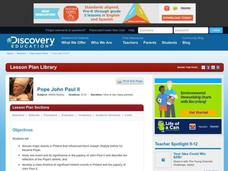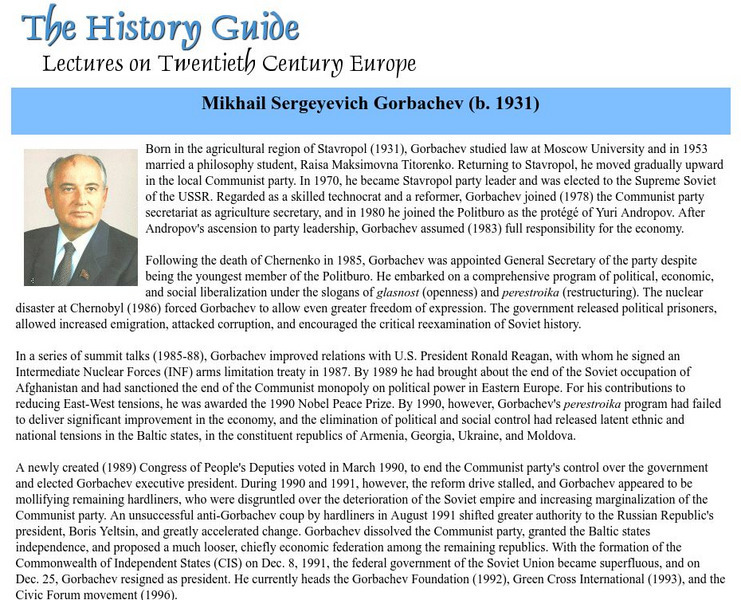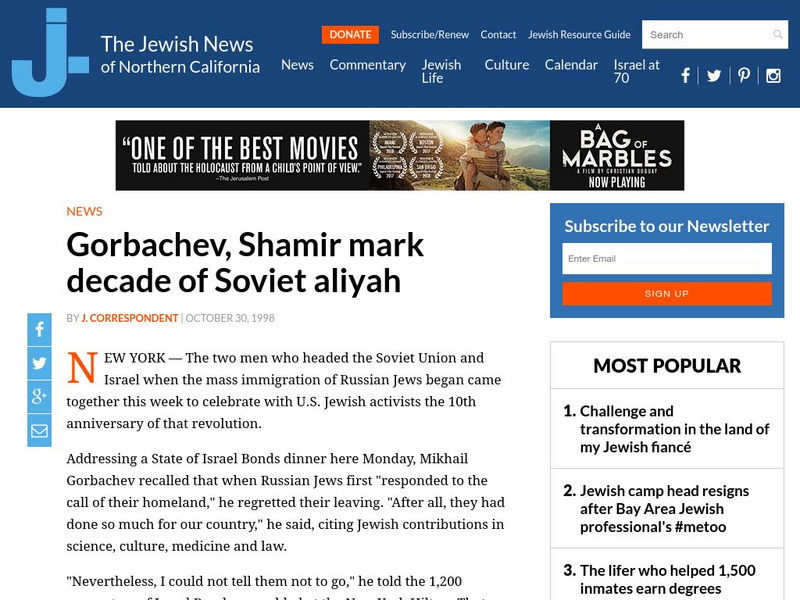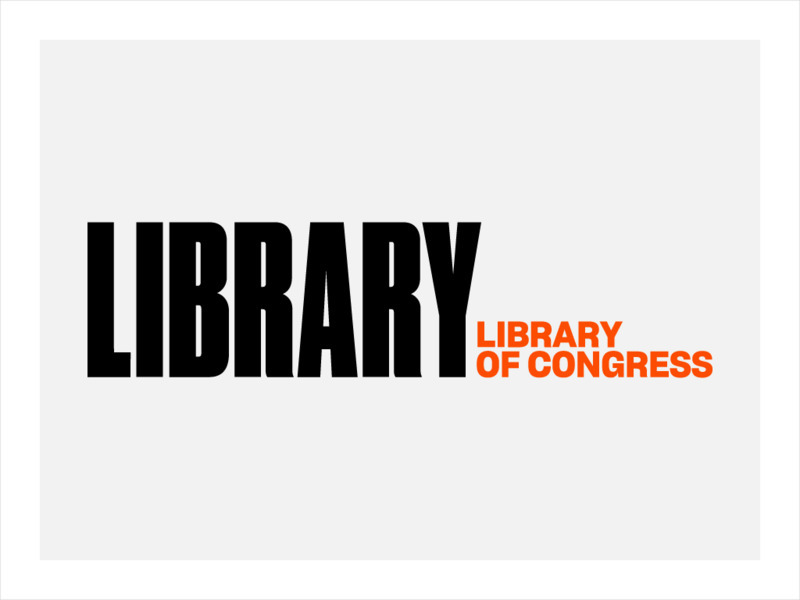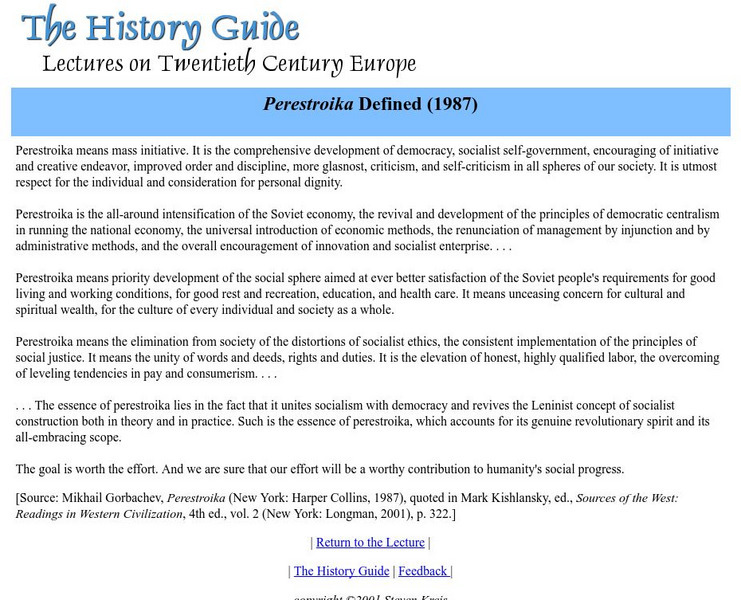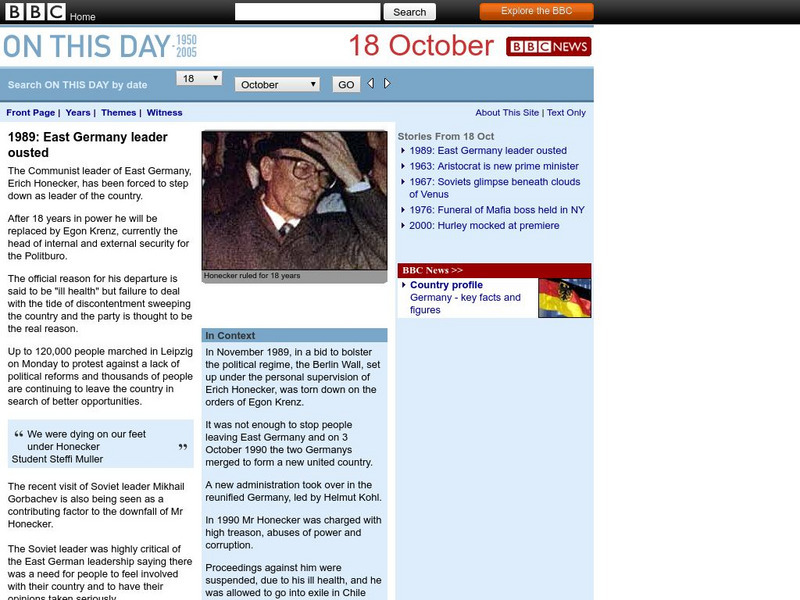Roy Rosenzweig Center for History and New Media
End of the Cold War
How significant was the Cold War during the 20th century? After reading and analyzing speeches by Ronald Reagan and Mikhail Gorbachev, learners consider the historical context of foreign policy decisions made during the Cold...
University of California
The End of the Cold War (1979-1991)
Scholars use primary and secondary documents, as well as video evidence, to investigate the end of the Cold War. After completing the final installment of an eight-part series, class members better understand the issues surrounding...
Curated OER
A Conservative Era
For this Conservative Era worksheet, students write definitions for six terms, examine five pairs of sentences then determine which one is false, then link two sets of words together by identifying which historical theme they share in...
Curated OER
Pope John Paul II
Students discover the accomplishments of Pope John Paul II. In this world history lesson, students research selected websites about the history of Poland, the accomplishments of Pope John Paul II, and...
Curated OER
Post-Cold War Europe
In this online interactive world history worksheet, students answer 20 matching questions regarding post-Cold War Europe. Students may submit their answers to be scored.
Curated OER
The End of the Cold War
In this end of the Cold War study guide worksheet, students read a brief overview pertaining to the time period in world history and then respond to 4 reflection questions.
Curated OER
US Government: Foreign Policy
Students explore the basic precepts of American foreign policy. In this diplomacy lesson, students read textbook chapters regarding American foreign policy practices before and after World War II. Students also watch a...
Curated OER
Global Review/World Leaders
Students are given a world leader to research a week before participating in a class game. Using the internet, they discover their major contribution to history and the time period and location in which they lived. They present their...
Curated OER
Nobel Peace Prize Winners
Students work in groups to complete biography overviews and research, organize information and decorate masks to look like their assigned Nobel Peace Prize winner. They present their information to the class as a group then independently...
Ducksters
Ducksters: Biography for Kids: Mikhail Gorbachev
A website containing the biography of Mikhail Gorbachev who was the leader of the Soviet Union who helped end the Cold War.
BBC
Bbc: Three Days That Shook the World
In 1991, communist hardliners attempted to overthrow Mikhail Gorbachev for his reforms leading to the break-up of the Soviet Union. The coup lasted for three days. Article dated August 15, 2001.
Steven Kreis, PhD
The History Guide: Mikhail Sergeyevich Gorbachev
Biographical account of Mikhail Sergeyevich Gorbachev, reformer of the Soviet Union. Includes information regarding Gorbachev's ascension to power with the Communist Party of the Soviet Union and his role in reducing the Cold War...
Other
Jewish News: Gorbachev, Shamir Mark Decade of Soviet Aliyah
This article provides insight into religious persecution in the former Soviet Union and Gorbachev's efforts to curb intolerance.
Country Studies US
Country Studies: Russia: Gorbachev's Reform Dilemma
An excellent article describing the Russian legislature (Congress of People's Deputies). Explains how and why this government instution was created. Also examines the various groups and factions which comprised this legislative body.
New York Times
New York Times: Times Machine: End of the Soviet Union
Images of the New York Times from December 26, 1991 depicting the fall of the Soviet Union and Mikhail Gorbachev.
Library of Congress
Loc: Perestroika
In these revelations from Russian archives, perestroika is explained. Mikhail Gorbachev's program of economic, political, and social restructuring, became the unintended catalyst for dismantling the totalitarian state. Also contains...
Digital History
Digital History: Collapse of Communism
Overview of the collapse of communism at the end of the 1980s and early 1990s ushered in by Mikhail Gorbachev and his reforms.
Steven Kreis, PhD
The History Guide: Perestroika Defined (1987)
Perestroika, as defined by Mikhail Gorbachev. This excerpt includes the many definitions and applications of the concept of perestroika when used to describe the internal reforms of the Soviet Union that occurred during the 1980s.
Boston University
Gorbachev's Reforms
University students discuss Gorbachev's life and reforms in the U.S.S.R. Also includes information about the Bolshevik Revolution.
Other
Picture History: Gorbachev and Reagan in Reykjavik
Image of Mikhail Gorbachev and Ronald Reagan at the Reykjavik Summit meeting in 1986.
InterKnowledge Corp.
The Soviet Era
Geographia presents a brief political and social history of Russia from the beginning of Soviet rule to the resignation of Gorbachev in 1990.
Smithsonian Institution
National Portrait Gallery: The Presidency and the Cold War: Ronald Reagan
The National Portrait Gallery presents a look at presidential actions and decisions about the Cold War. Click on Ronald Reagan to see how his anti-Communist beliefs led to increases in the defense budget, but also, by the end of his...
BBC
Bbc: 1989: East German Leader Ousted
This BBC article describes how popular unrest which lead to the ousting of East Germany leader Erich Honecker. Examines protests on the part of East German citizens and Gorbachev's decision to remove Honecker.
BBC
Bbc: News: Collapse of the Ussr 10 Years On
Extensive information about the collapse of the USSR. Includes an interactive timeline from 1985 through 1991, an interactive map of the countries of the USSR with country profiles and timelines, eyewitness accounts of the collapse of...



